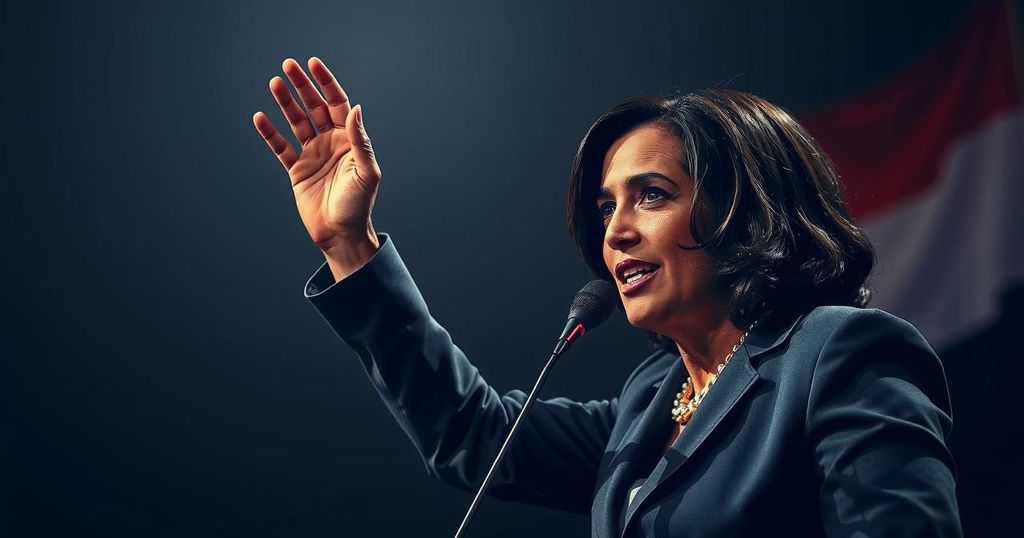Navigating Political Turbulence: Kamala Harris and the Precarious Path to 2024

Vice President Kamala Harris faces significant political challenges as the Biden administration grapples with widespread dissatisfaction stemming from mismanagement in domestic and foreign policy. With the looming 2024 elections, Harris’s future may hinge on her alignment with aggressive foreign policy maneuvers, particularly concerning Iran, as she attempts to secure her political standing against a resurgent Donald Trump and mitigate the impact of Biden’s perceived failures.
The political landscape in the United States faces significant turbulence as the 2024 election approaches, primarily due to the ongoing challenges of the Biden administration and the rising possibility of a Donald Trump resurgence. Recognized as a polarizing figure, Vice President Kamala Harris has found her political future increasingly uncertain as she navigates the consequences of a presidency marred by dissatisfaction and controversial policy decisions. President Biden’s handling of domestic and foreign affairs has attracted extensive criticism, which has cast a shadow over Harris, who has been designated as the administration’s point person on several contentious issues, including immigration policy. Domestically, Biden’s administration has struggled significantly with the response to the COVID-19 pandemic, leading to public frustration and disillusionment. The chaotic management of public health policies, marked by reliance on contentious figures like Dr. Anthony Fauci, has failed to provide a unified approach. The administration’s foreign policy decisions, particularly concerning involvement in the Ukraine conflict and escalating tensions in the Middle East, have compounded difficulties, resulting in a loss of American credibility and diplomatic standing globally. Harris’s role as “Border Czar” has exposed her to further criticism as illegal immigration has surged across the southern border. These circumstances have given rise to skepticism regarding both her capability and the broader effectiveness of the Biden-Harris political agenda. The linkage between Biden’s actions and the legacy of former President Barack Obama has further complicated Harris’s political positioning. The perception that Harris represents an extension of Obama’s policies has elicited dissatisfaction among voters who anticipated a departure from previous approaches. In this context, the Biden administration’s military engagements—contrary to Trump’s withdrawal strategy—have rekindled global tensions, including conflicts in the Middle East and Africa. As the Biden administration confronts these formidable challenges, Harris’s attempts to carve out her distinct identity in the political arena become increasingly frenetic. Mounting pressure may lead Harris towards a strategic military maneuver against Iran—historically a tactic employed by Democratic administrations to refocus public attention during electoral cycles. A significant military operation against Iran, possibly with full-scale aerial support and collaboration with Israeli forces, could create the impression of decisive leadership on her part. Nevertheless, the inherent risks associated with such an escalation could further entrench the United States in enduring conflicts, which many Americans are now disillusioned about after prolonged military engagements in the Middle East. In sum, Kamala Harris is poised at a critical juncture; her political survival hinges on her ability to navigate a precarious landscape marked by increasing dissatisfaction among voters and the specter of Donald Trump’s potential return to power. Should current trends persist, a militaristic strategy may present itself as a last-ditch effort for relevance amid a chaotic political backdrop.
The article explores the precarious political position of Vice President Kamala Harris in light of President Joe Biden’s declining favorability and the possibility of Donald Trump’s resurgence in the political arena as the 2024 election approaches. It analyzes the perceived failures of the Biden administration across various domains, including domestic issues like the COVID-19 response and foreign affairs, including military engagements in Ukraine and the Middle East. The narrative posits that Harris, tasked with significant responsibilities, faces scrutiny for her role in these compounding issues, all while attempting to establish her identity separate from the legacies of Biden and Obama.
The political climate for Vice President Kamala Harris is fraught with challenges as the Biden administration grapples with widespread dissatisfaction. Her attempts to dissociate from Biden’s policies and legacy of Barack Obama may compel her toward aggressive foreign policy maneuvers, particularly concerning Iran, as she seeks to maintain relevance in a competitive political landscape. However, such a strategy carries the risk of exacerbating existing conflicts and alienating voters disillusioned by decades of military entanglement. Harris’s political future appears tenuous, hinging on her ability to navigate these complexities in the forthcoming election cycle.
Original Source: ozarab.media








